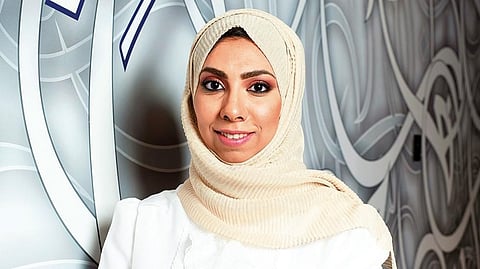Modern game changers: molecular biologist Wafaa Ramadan
Wafaa Ramadan, whose research in 'cellular stress' could have practical implications in cancer treatment, is among a new breed of scientists who are putting the UAE’s scientific prowess in the spotlight

Think trailblazing scientists and Isaac Newton, Albert Einstein and Stephen Hawking spring to mind immediately. How often does Polish-French scientist Marie Curie make that list? The sad truth is, rarely. It’s this narrative the L’Oreal-Unesco For Women in Science programme is trying to change since 1998. ‘The initiative has supported over 3,200 women, rewarded 107 laureates (three have since won Nobel Prizes), granted fellowships in 118 countries till date,’ says Remi Chadapaux, managing director of L’Oreal Middle East. The Middle East Fellowship, now in its sixth year, has been putting female Arab scientists on the global map.
In this series, we speak to three current fellows (announced in November) and three past ones of the Middle East Fellowship.
Also in this series:
- Modern game changers: Dr Habiba AlSafar, pioneer in genetics
- Modern game changers: Dr Saba Al Heialy, uncovering links between obesity and asthma
- Modern game changers: Dr Maha Al Mozaini, overcoming cultural taboo in HIV research
- Modern game changers: Dr Fatma Al Ma’Mari, experimental physicist
- Modern game changers: Dr Wafa Audah Altalhi, futuristic research on bioengineered organs
Wafaa Ramadan, molecular biologist and doctoral student and present recipient of L’Oreal-Unesco For Women in Science Fellowship
When Wafaa Ramadan, a doctoral student at Sharjah University, received an email from the L’Oreal-Unesco Women in Science fellowship authorities informing her that she’d been selected as a fellow from the Arab region, she read it twice. Then a couple more times. Because one of her ambitions had actually come true; the 10 hours she clocks daily (14 on busy days) sequestered in labs, peering through microscopes into the very heart of breast cancer cells, meant something to the world at large.
‘I was so excited,’ the Emirati admits. ‘I’d wanted to apply last year but didn’t meet some of the criteria. This year my supervisor Dr Raafat El-Awady encouraged me to apply in the PhD students’ category.’
Looking back, Wafaa is pleased the faith and trust of her male supervisors and professors in her skills as a researcher guided her when she stood on the precipice of a cardinal decision – pursuing a master’s after graduation. ‘I wasn’t planning to do it. [But] one of my undergraduate project supervisors insisted I should. Sometimes you don’t realise you’re good unless someone experienced points it out and supports you.’
As a middle child in a family of six, and a daughter to boot, Wafaa’s request to pursue her master’s bemused her family. ‘I’m the first in my family to complete my higher education and reach this level,’ she confesses modestly. ‘It wasn’t easy for them to understand but I convinced them and today they are very accepting of my passion for science and biology and what I want to do in my life.’
They’re accepting to the extent that when she dragged her feet working as a research assistant deliberating a PhD, they spurred her on to enrol; even when some in her community wondered why she wouldn’t rather get married and stay home. ‘[Perceptions] about women’s capabilities are changing now in the Arab world,’ Wafaa acknowledges, launching into what makes her work every bit as fulfilling as domesticity.
Wafaa’s work includes trying to understand the response of cancer cells to cellular stress (inhospitable conditions such as not enough nutrients or oxygen) created by anti-cancer drugs to kill these cells, and why some cancer cells have developed mechanisms that help them overcome cellular stress. Another area of her study involves probing the existence of certain biomarkers or proteins that are high in breast cancer patients and whether they are connected to the cancer cell’s ability to be unaffected by anti-cancer drugs.
If Wafaa manages to ascertain her hypothesis into a working theory, it will have an impact on modern medicine. For starters, it will help medical professionals create effective therapies that target the biomarkers and hence weaken stubborn cancer cells, making them easier to destroy.
Early and accurate breast cancer diagnosis too is an upshot of her research, Wafaa points out, as a high expression of these markers can indicate the existence of cancer cells. Considering that breast cancer is one of the UAE’s leading health burdens – 39 per cent of women diagnosed with cancer last year were breast cancer patients – Wafaa’s research is both topical and game-changing. ‘There are limited studies on breast cancer cells’ response to cellular stress and that’s why I chose this direction – it’s promising,’ she says.
The fellowship has not only opened doors for Wafaa to visit other labs working on similar fields of research overseas, but also connected her to other reputed scientists and developed her skills. Of course, it’s also granted her a financial windfall of 8,000 euros (around Dh32,000) that will result in supplies and equipment.
The financial assistance and chances to network that will support her to discover cancer’s Achilles’ heel mean a lot to Wafaa on the personal front too as she has seen the devastation the disease can wreak up close. ‘My uncle’s wife suffered from breast cancer and my father’s cousin died of leukaemia. It’s not an easy disease to be treated and not every patient responds the same to treatment, which is why it’s important to conduct more research into how cancer cells are formed.’
What if that takes years of 13 to14-hour work days?
‘I don’t mind it,’ she says. ‘Because I have a goal to reach and I want someone to benefit from and build on this research.’




